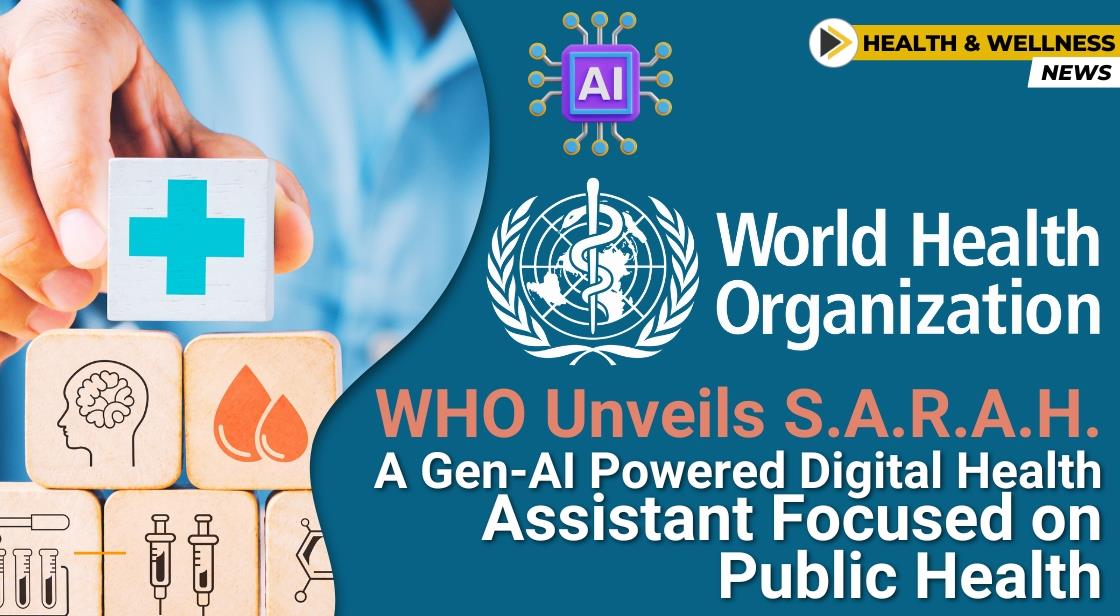WHO Unveils S.A.R.A.H.: A Gen-AI Powered Digital Health Assistant Focused on Public Health

News Synopsis
In a significant step towards leveraging technology for public health, the World Health Organization (WHO) has launched S.A.R.A.H. – a digital health promoter powered by generative artificial intelligence (AI). This announcement comes ahead of World Health Day, highlighting WHO's commitment to harnessing the potential of AI to improve global health outcomes.
S.A.R.A.H.: An Evolution in AI-powered Health Information
S.A.R.A.H. stands for Smart AI Resource Assistant for Health. It represents a significant advancement in AI-powered health information tools. Unlike previous iterations that relied on pre-programmed responses, S.A.R.A.H. utilizes generative AI to provide more dynamic and personalized interactions.
-
24/7 Availability & Multilingual Support: S.A.R.A.H. can engage users in eight languages, 24 hours a day, across various devices, making health information readily accessible.
-
Focus on Major Health Topics: WHO emphasizes S.A.R.A.H.'s ability to deliver information on crucial health areas like healthy habits, mental health, and chronic disease prevention.
-
Personalized Support: Generative AI allows S.A.R.A.H. to tailor conversations to individual needs, fostering a more engaging and informative experience.
-
Emphasis on User Empowerment: WHO positions S.A.R.A.H. as a tool for individuals to take charge of their health and well-being by providing them with the resources to make informed decisions.
Addressing Leading Causes of Death
S.A.R.A.H. specifically targets risk factors associated with the world's leading causes of death, including:
-
Cancer
-
Heart Disease
-
Lung Disease
-
Diabetes
The WHO highlights S.A.R.A.H.'s ability to provide users with up-to-date information on:
-
Smoking cessation
-
Physical activity
-
Healthy eating
-
Stress management
The Future of Health Information Delivery
Dr. Tedros Adhanom Ghebreyesus, WHO Director-General, emphasizes the potential of S.A.R.A.H. to revolutionize access to health information. He underscores the importance of continued research to explore how AI can be harnessed to:
-
Improve Access: S.A.R.A.H. paves the way for more interactive and accessible health information delivery, particularly in underserved communities.
-
Reduce Inequities: The WHO calls upon researchers to explore how AI can bridge health information gaps and ensure equitable access for all.
Addressing Ethical Concerns Around AI in Healthcare
While acknowledging the immense potential of AI in public health, the WHO acknowledges the ethical considerations surrounding this technology. Key areas of concern include:
-
Equitable Access: Ensuring everyone has the opportunity to benefit from AI-powered health solutions.
-
Privacy and Data Protection: Guaranteeing user privacy and safeguarding sensitive health data.
-
Safety and Accuracy: Maintaining the accuracy and reliability of AI-generated information.
-
Bias Mitigation: Addressing potential biases within AI algorithms to ensure fair and inclusive healthcare delivery.
Continuous Development and Responsible Use
The WHO emphasizes its commitment to responsible and ethical development of AI for public health. S.A.R.A.H. is envisioned as a continuously evolving platform, with a focus on providing reliable, accessible, and evidence-based health information.
Building on Past Success: S.A.R.A.H. and its Predecessor
This is not WHO's first foray into digital health assistants. During the COVID-19 pandemic, a previous iteration named Florence was instrumental in disseminating critical public health messages on topics like:
-
The virus itself
-
Available vaccines
-
Tobacco use
-
Healthy eating habits
-
Importance of physical activity
The launch of S.A.R.A.H. builds upon this success, leveraging advanced AI to deliver a more personalized and interactive health information experience.
You May Like









